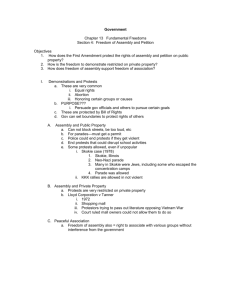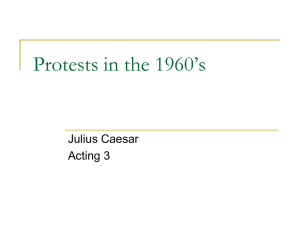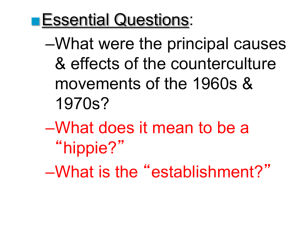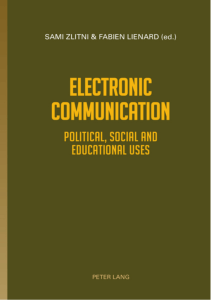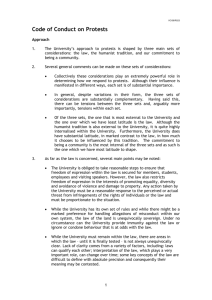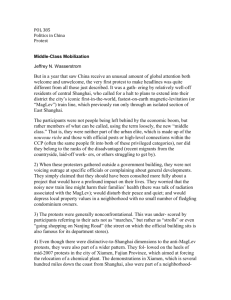Violent Service Delivery Protests in the Governance of
advertisement
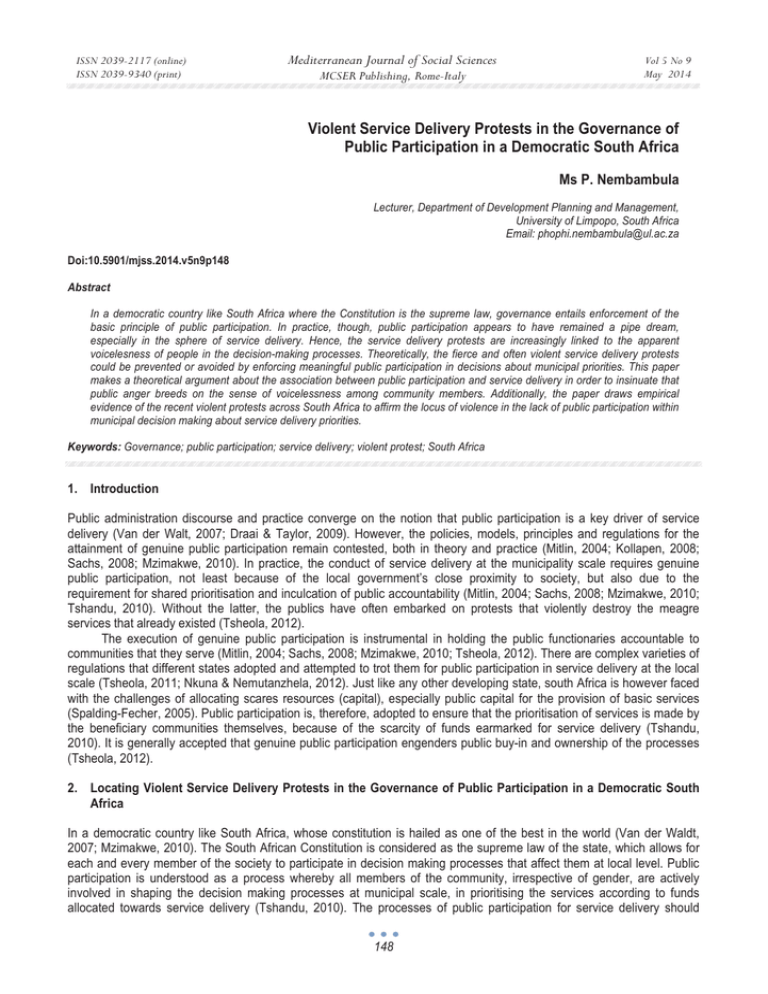
ISSN 2039-2117 (online) ISSN 2039-9340 (print) Mediterranean Journal of Social Sciences MCSER Publishing, Rome-Italy Vol 5 No 9 May 2014 Violent Service Delivery Protests in the Governance of Public Participation in a Democratic South Africa Ms P. Nembambula Lecturer, Department of Development Planning and Management, University of Limpopo, South Africa Email: phophi.nembambula@ul.ac.za Doi:10.5901/mjss.2014.v5n9p148 Abstract In a democratic country like South Africa where the Constitution is the supreme law, governance entails enforcement of the basic principle of public participation. In practice, though, public participation appears to have remained a pipe dream, especially in the sphere of service delivery. Hence, the service delivery protests are increasingly linked to the apparent voicelesness of people in the decision-making processes. Theoretically, the fierce and often violent service delivery protests could be prevented or avoided by enforcing meaningful public participation in decisions about municipal priorities. This paper makes a theoretical argument about the association between public participation and service delivery in order to insinuate that public anger breeds on the sense of voicelessness among community members. Additionally, the paper draws empirical evidence of the recent violent protests across South Africa to affirm the locus of violence in the lack of public participation within municipal decision making about service delivery priorities. Keywords: Governance; public participation; service delivery; violent protest; South Africa 1. Introduction Public administration discourse and practice converge on the notion that public participation is a key driver of service delivery (Van der Walt, 2007; Draai & Taylor, 2009). However, the policies, models, principles and regulations for the attainment of genuine public participation remain contested, both in theory and practice (Mitlin, 2004; Kollapen, 2008; Sachs, 2008; Mzimakwe, 2010). In practice, the conduct of service delivery at the municipality scale requires genuine public participation, not least because of the local government’s close proximity to society, but also due to the requirement for shared prioritisation and inculcation of public accountability (Mitlin, 2004; Sachs, 2008; Mzimakwe, 2010; Tshandu, 2010). Without the latter, the publics have often embarked on protests that violently destroy the meagre services that already existed (Tsheola, 2012). The execution of genuine public participation is instrumental in holding the public functionaries accountable to communities that they serve (Mitlin, 2004; Sachs, 2008; Mzimakwe, 2010; Tsheola, 2012). There are complex varieties of regulations that different states adopted and attempted to trot them for public participation in service delivery at the local scale (Tsheola, 2011; Nkuna & Nemutanzhela, 2012). Just like any other developing state, south Africa is however faced with the challenges of allocating scares resources (capital), especially public capital for the provision of basic services (Spalding-Fecher, 2005). Public participation is, therefore, adopted to ensure that the prioritisation of services is made by the beneficiary communities themselves, because of the scarcity of funds earmarked for service delivery (Tshandu, 2010). It is generally accepted that genuine public participation engenders public buy-in and ownership of the processes (Tsheola, 2012). 2. Locating Violent Service Delivery Protests in the Governance of Public Participation in a Democratic South Africa In a democratic country like South Africa, whose constitution is hailed as one of the best in the world (Van der Waldt, 2007; Mzimakwe, 2010). The South African Constitution is considered as the supreme law of the state, which allows for each and every member of the society to participate in decision making processes that affect them at local level. Public participation is understood as a process whereby all members of the community, irrespective of gender, are actively involved in shaping the decision making processes at municipal scale, in prioritising the services according to funds allocated towards service delivery (Tshandu, 2010). The processes of public participation for service delivery should 148 ISSN 2039-2117 (online) ISSN 2039-9340 (print) Mediterranean Journal of Social Sciences MCSER Publishing, Rome-Italy Vol 5 No 9 May 2014 serve as a mechanism for cultivating a spirit of accountability, both for the public functionaries and citizens at local scale (Tshandu, 2010). However, genuine public participation curbs the space for the rebellion of the public by taking to the streets violently. Draai & Taylor (2009) argues that public participation is an essential component for the enhanced and effective accountable governance, which encourages public accountability and confidence in local government. Thus, it is assumed that public participation is a ticket to effective service delivery for local municipalities. The incorporation of public opinion and views in decision making processes promote public accountability and gain confidence of the public in local governance for service delivery (Draai & Taylor, 2009; Tsheola, 2011, 2012). Violence in the exercise of a constitutional right to protest would not arise under circumstances where the public is involved in influencing and shaping decision making processes, which is evidence of genuine public participation in service delivery decision making (Tsheola, 2011, 2012). In cases where members of the community involve violence in the exercise of a constitutionally protected right to protest, questions need to be asked about the municipality’s conduct of public participation on service delivery. In South Africa, service delivery protests are dated as far back as 2004/05 wherein about 6000 protests were recorded which meant that at least 15 protests were taking place each day (http://en.wikipedia.org/wiki/Protest_in_South_Africa). The discrepancies in policy and practice of public participation have made members of the community to use violent protest as a mechanism for effective service delivery, with the belief that violence is the language that is well understood by public functionaries and is a culture that has been adopted from the apartheid era. The conduct of municipal public participation affect service delivery and, potentially, fuelling the attendant violent protest. Whereas protest is one of the rights provided for through the constitution, the violence that has accompanied demonstrations about service delivery has raised questions of public ownership and accountability in regard to the processes of municipal prioritisation of services to be delivered. South Africa has in recent years faced with a challenge of fierce violent service delivery protests (Tsheola, 2011, 2012); but Mpumalanga province has made extraordinary headlines, compelling president Zuma to travel there in the hope of resolving the impasse that developed between members of the community and the public functionaries. 3. Governance of Public Participation in South Africa The Supremacy of public administration in South Africa entails the basic principle of public participation which is “people cantered” and “human centric”. However, there is discrepancy in the practice and policy of public participation. Thus, the execution of public participation appears to have remained a pipe dream, especially in the sphere of service delivery. Across the world, states have adopted complex varieties of regulations, and attempted to trot them for public participation in service delivery at the local scale (Tsheola, 2011; Nkuna & Nemutanzhela, 2012). Due to the close proximity of the local government to the society, the constitution of the republic of South Africa ( RSA) 1996 sets out objectives for the government close to the people in section 152(1) which are to provide democratic and accountable local government for local communities; ensure the provision of services to communities in a sustainable manner; promote social and economic development; and encourage the involvement of communities and organisations in matters of local government. Moreover, in achieving the objectives set out for the local government, public participation is therefore, adopted to ensure that the prioritisation of services is made by the beneficiary themselves, based on the scarcity of public funds earmarked for service delivery (Tshandu, 2010). The Local government ought to ensure genuine public participation in steering service delivery processes at local level, not because of its close proximity to the society, but due to the obligation for shared prioritisation and the inculcation of public participation (Mitlin, 2004; Sachs, 2008; Mzimakwe, 2010). Public participation can be seen as a process of deepening and consolidating democracy by, encouraging the participation of citizens in the process of governance which promote a responsive and accountable government whose decisions are accepted and respected by the people. South African constitution provides for the framework for a democratic system that is both representative and participatory. Representative democracy, which is members of the community elect representatives to directly represent the views of the people who voted them into power. Members of the community give their representative a specific mandate to speak and make decisions on their behalf. The participatory democracy is a form of representative democracy in which members of the community are actively involved in the decision making processes of government (Nkuna & Nemutanzhela, 2012). South Africa too, has adopted complex varieties of regulations for public participation in service delivery at local scale. The different regulations adopted for the governance of public participation in South Africa are as follows: the constitution of the republic; South African Local Government Association (SALGA); the Bill of Responsibility; Local Government’s Municipal structures act no. 117 of 1998, municipal systems act no. 32 of 2000; and the National 149 ISSN 2039-2117 (online) ISSN 2039-9340 (print) Mediterranean Journal of Social Sciences MCSER Publishing, Rome-Italy Vol 5 No 9 May 2014 Development Plan 2030. All the above regulations share a common goal which is participation by members of the community to ensure effective service delivery. The constitution of the republic of South Africa (RSA) 1996 provides for a broadly representative constitutional democracy, place legislatures wherein, the involvement of the public is facilitated in the legislative and other processes of the assembly and that the local government conduct its business in an open manner, and hold its sittings in public (Nkuna & Nemutanzhela, 2012). However, the same constitution goes on to say that people’s needs must be responded to, and the public must be encouraged to participate in policy and decision making processes. Thus public administration must be accountable and transparency must be fostered by providing the public with timely, accessible and accurate information. In acknowledging the service delivery challenges faced by local municipalities, it is suggested in Chapter 13 of the National Development Plan 2030 that there should be ways in which municipal performance can be improved to ensure service delivery. It also suggests reviewing the way municipalities are funded and the levels of services they should provide in light of the difficulties that those serving mainly poor communities face. 4. Voicelessness and Marginalization of the Public: Illustrations from South Africa South African communities have adopted the representative democracy more than the participatory. The latter is supported by the ethnographic observations made whereby members of the community are not accountable for any decision or planning processes in their local municipalities. The trend in which service delivery protests occur raises questions about municipal efficiency in service delivery. Mail and Guardian reported on what the Mpumalanga police spokesperson, Captain Leonard Hlathi who said that the protests that are believed to be about service delivery are somehow also about members of the community not being happy about the candidates on the list of local government elections (Mail & Guardian, February 15, 2011). Moreover, premier of Mpumalanga David Mabuza said on Mail and Guardian, February 19, 2010 that service delivery protest in Mpumalanga have revealed problems with financial management, institutional capacity and leadership. From interviewing the local people, an attempt was made in trying to understand their roles in decision making about service delivery. The understanding is that people who are on the forefront of “Service delivery protests” are people who at some stage formed part of the municipality management or who were in the municipality in a different form previously. And once those people were removed from power their voices were marginalised as it was done to other voices when they were in power. The South African constitution provides for all members of the community to protest provided they follow proper channels to do so. However, the very same constitution does not allow for the protests to become violent “violent Service Delivery Protests”. The marginalisation of voices that occur during shifting of powers is now considered as a normal practice among members of the community and the public functionaries, and the understanding is that these violent protests formant from the marginalization of voices. The assumption that the violent in service delivery protest formats because of marginalization in voices during shifting of powers can be well attested by looking at the trends of violent service delivery protests, looking at when they occur and for how long, Most protests starts just before the local government election and last until the eleventh hour before the election. Recently, South Africa experienced numerous occasions of violent protests in several places which are now referred to as service delivery protests. Balfour, Ficksburg, Relela, Bronkhorstspruit and Sebokeng, are amongst the service delivery protest hotspots making headlines recently. The recent protests that are alleged to be about service delivery most of them have turned violent and the understanding among members of the community is that there are reasons underlying the violence in them practicing their constitutional right to protest. The underlying reasons of violence in service delivery protests ranges from members of the community somehow thinking they have lost their power as a result of government officials who deliberately put deaf ears to the ground after being elected into office, as a result the elected councillors failing to represent the community in matters that bothers them to the municipality like water, electricity and sanitation (Sowetan, February 7, 10, 2014). Members of the community feel they should not be paying for water and electricity (The Citizen, February 7, 2014). The Government making empty promises and the people’s known needs not being met (Drum magazine, February 20, 2014), and the High level of unemployment among young people (http:mg.co.za/article/2014-0212). During the alleged service delivery protests Authorities do not interact with communities on the streets and when they have to listen they do it bureaucratically not sympathetically, at the end members of the community turn to violence (http:mg.co.za/article/2014-02-12). 150 ISSN 2039-2117 (online) ISSN 2039-9340 (print) Mediterranean Journal of Social Sciences MCSER Publishing, Rome-Italy Vol 5 No 9 May 2014 5. Conclusion The paper emphasized the fact that public participation and municipal service delivery is the key driver towards effective service delivery. With genuine public participation a spirit of ownership and accountability is cultivated amongst members of the community and public functionaries. In locating violent service delivery protests, there are various areas where they can be located, notwithstanding the fact that not all protests are service delivery related, some are politically influence and some are due to marginalization and understanding that service delivery protests at local level usually take place before local government elections. However, the paper recommends that there be a reorientation of leadership so that the violence in service delivery protests can be reduced. References Draai, E. & Taylor, D. 2009. Public participation for effective service delivery: a local government perspective. Journal of Public Administration 44(1.1):112-122. Drum magazine, February 20, 2014 Kollapen, J. 2008. Public participation in democracies. South African Journal of Social and Economic Policy 32:33-35. Mail & Guardian, February 19, 2010. Mail & Guardian, February 15, 2011. Mitlin, D. 2004. Reshaping local democracy. Environment and Urbanisation 16(1):3-8. Mzimakwe, T. 2010. Public participation and engagement in local government: a South African perspective. Journal of Public Administration 45(4):501-519. National Planning Commission (NPC), 2012. National Development Plan 2030: Our Future – Make it Work. The Presidency, Pretoria. Nkuna, N.W. & Nemutanzhela, T.L. 2012. Locating the role of service delivery within powers and functions of local government in South Africa. Journal of Public Administration 47(11):355-368. Republic of South Africa (RSA) 1996. The Constitution of the Republic of South Africa, 1996. Government Printers, Pretoria. Sachs, J.A. 2008. Participatory democracy. South African journal of social and economic policy 32:33-35. Sowetan, February 7, 10, 2014 Spalding-Fecher, R. 2005. Health benefits of electrification in developing countries: a quantitative assessment in South Africa. Energy for Sustainable Development IX (1), 53-62. The Citizen, February 7, 2014 Tshandu, J.P. 2010. Service plans as accountability mechanisms: evidence from the South African public service. Administratio Publica 18(4):46-70. Tsheola, J.P. 2011. Purposeful service delivery planning approach and the violent protest paradoxes in South Africa: a community development perspective. Paper presented at the 2nd International Conference on Local Government (ICLG), October 26-28, 2011, at the Blue Waters Hotel, Durban. Tsheola, J.P. 2012. Theorizing a democratic developmental state: issues of public service delivery planning and violent protest in South Africa. Journal of Public Administration 47(1):161-179. Van der Waldt, G. 2007. Fostering local democracy. In G van der Waldt, ed. Municipal Management: Serving the People. Juta, Cape Town. http://en.wikipedia.org/wiki/Protest_in_South_Africa (Accessed June 27, 2013) http:mg.co.za/article/2014-02-12 (Accessed February 24, 2014) 151
